Page documenting information on Brett Barnes and Michael Jackson and all the public information he has posted.
Don't wanna be here? Send us removal request.
Text
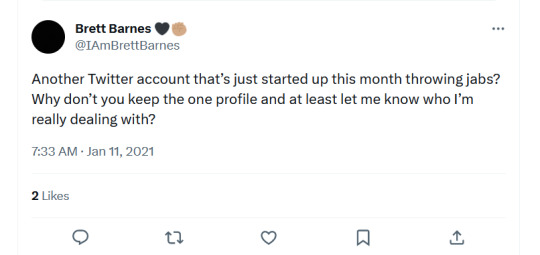
On Jan 11, 2021 Brett Barnes tweeted:
"Another Twitter account that's just started up this month throwing jabs? Why don't you keep the one profile and at least let me know who I'm really dealing with?"
In this tweet, Brett Barnes raises an interesting point about anonymous Twitter accounts. However, it is worth noting the irony in his statement, as his own Twitter account remained anonymous for over a decade. It wasn't until he posted a picture of himself wearing a suit to Michael Jackson's trial in 2005 that his identity became somewhat known. Even to this day, his account lacks a profile picture and provides very limited information.
Furthermore, despite his lack of verification, Barnes made bold and disrespectful statements towards James Safechuck and Wade Robson, who have spoken out about their experiences with sexual abuse. These tweets showed a lack of empathy and sensitivity towards a serious issue.
Considering Barnes' history of anonymity and his derogatory tweets, his criticism of others for "throwing jabs" seems both laughable and hypocritical. It's important to remember that online interactions should be conducted with respect and integrity, regardless of personal opinions or disagreements.
0 notes
Text
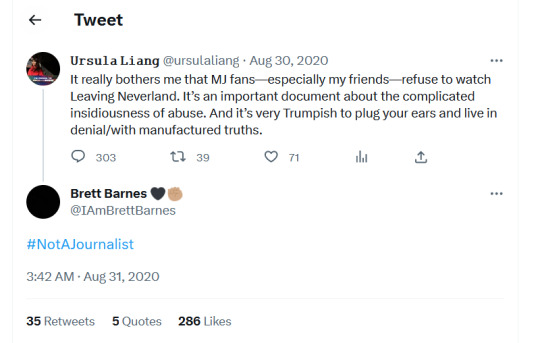
On August 31, 2020, Brett Barnes took to Twitter to express his thoughts regarding a journalist who had tweeted positively about James Safechuck and Wade Robson, the subjects of the controversial documentary, Leaving Neverland. Barnes, known for his association with the late pop star Michael Jackson, tweeted with the hashtag #NotAJournalist, expressing his disagreement with the journalist's stance.
While it is important to encourage open discussions and differing opinions, it is crucial to approach sensitive topics such as sexual abuse with respect and empathy towards survivors. Unfortunately, Barnes's tweet seems to lack the sensitivity required when discussing the experiences of those who have allegedly suffered abuse.
It is worth noting that Brett Barnes holds strong beliefs regarding Michael Jackson's innocence, and he has the right to express his views. However, the manner in which these views are conveyed can greatly impact the dialogue surrounding such a contentious issue. Critics argue that Barnes often resorts to blunt and seemingly cowardly retorts on social media, rather than engaging in civilized, factual, and balanced arguments.
In light of the seriousness of the allegations made in Leaving Neverland and the impact on the lives of the individuals involved, it is important for all parties to respect the experiences and perspectives of survivors. Constructive and respectful dialogue can help shed light on important issues while ensuring that survivors are not re-victimized or discredited in the process.
While it is essential to question and examine different perspectives, it is equally important to do so in a manner that does not undermine or invalidate the experiences of those who have come forward. In engaging with sensitive topics like this, it is crucial to foster a climate of compassion, understanding, and open-mindedness.
It is our hope that future discussions on this subject can be conducted with greater sensitivity and respect for survivors, ensuring that all voices are heard and considered in a manner that promotes a deeper understanding of the complex issues at hand.
0 notes
Text

Barnes' tweet, which was in support of Taj Jackson's opinion, fueled the ongoing debate surrounding the credibility of Safechuck and Robson's allegations against Michael Jackson.
Barnes' statement not only undermines the media's support for the two men but also questions their journalistic integrity. While it is legitimate to expect well-researched reporting, it is crucial to approach these matters with sensitivity and empathy. Criticizing media outlets and suggesting that individuals should be fired for expressing their support may hinder the progress made in creating a safe space for survivors of abuse.
It is vital to understand the complexities and emotional toll that survivors of abuse face when sharing their stories. Dismissing their claims without thorough investigation and research can potentially perpetuate harmful skepticism and further marginalize survivors.
In conclusion, while it is essential to foster meaningful discussions around controversial issues, dismissing allegations of child abuse without proper examination can have damaging effects on survivors and perpetuate a culture that silences and discredits their experiences. A more empathetic and thoughtful approach is necessary when addressing these sensitive matters in order to promote healing, empathy, and understanding.
0 notes
Text

In today's digital world, privacy has become a hotly debated topic. With information readily available at our fingertips and social media platforms becoming increasingly prevalent, the concept of privacy seems to be diminishing. On 4 August 2020, Brett Barnes took to Twitter to express his thoughts on this contentious issue, stating, "The thing about privacy is that once it's gone, it's gone. Tell me though, why do you think that it could be a good idea?"
This tweet emerged in response to another user who raised suspicions about whether the Brett Barnes Twitter account truly belonged to him or if it could potentially be an impostor. The lack of images and verifiable information fueled speculations, prompting a greater need for transparency.
It is worth noting that the Brett Barnes account has since been verified. However, some argue that his previous criticisms towards James Safechuck and Wade Robson, along with his dismissal of their allegations, reveal a level of hypocrisy. By choosing to remain anonymous behind a computer screen, Barnes has been criticized for not being upfront and honest about his identity.
1 note
·
View note
Text

On July 2, 2020, Twitter witnessed an intriguing exchange between Brett Barnes and a Michael Jackson fan. The discussion revolved around Paris Jackson, the daughter of the late pop icon. Brett Barnes, known for his affiliation with Michael Jackson's inner circle, shared his thoughts about Paris not constantly praising her father. In his tweet, Barnes stated, "She's a grown woman who can make her own decisions. It should be celebrated that she wants to be a beacon for peace and love. That's exactly what Applehead stood for. You don't have to forgive or forget anyone who did him wrong, I sure don't, but she definitely can."
The use of the term "Applehead" caught the attention of many, as it referred to a special club that Michael Jackson had created for his young friends. Barnes seemed to attribute the club's values of peace and love to Michael. However, upon closer examination, an apparent hypocrisy emerges.
While Barnes defended Paris Jackson's right to make her own choices, his own behavior towards Wade Robson and James Safechuck, two individuals who accused Michael Jackson of sexual abuse, tells a different story. Barnes has been known to consistently post derogatory and disrespectful tweets towards Robson and Safechuck, disregarding their allegations and failing to take them seriously. This contradiction raises important questions about Barnes' understanding of peace, love, and justice.
In the realm of advocacy for peace and love, inconsistencies like these are not only disheartening but also counterproductive. It is essential to recognize that defending one's beliefs should not come at the expense of demeaning or disregarding the experiences of others. True peace and love require empathy, understanding, and a commitment to justice.
This blog aims to shed light on the hypocrisy displayed by Brett Barnes and encourages a deeper reflection on the values we claim to uphold. By recognizing and addressing these contradictions, we can strive for a more inclusive, compassionate, and sincere environment, one that truly embodies the principles of peace, love, and respect for all.
1 note
·
View note
Text
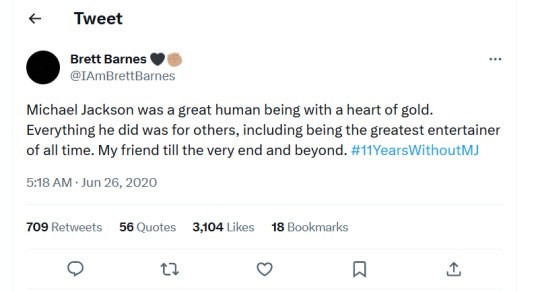
On 26 June, 2020, Brett Barnes tweeted:
Michael Jackson was a great human being with a heart of gold. Everything he did was for others, including being the greatest entertainer of all time. My friend till the very end and beyond. #11YearsWithoutMJ
However, let's delve into the complexities and nuances surrounding this tweet. It is worth noting that Brett Barnes has posted derogatory tweets towards James Safechuck and Wade Robson, which can be seen as contradictory to his praise of Michael Jackson. One might expect that someone who spent time with Jackson would have imbibed some of his admirable qualities, but apparently, this didn't happen.
It's important to remember that humans are multifaceted beings and possess both strengths and weaknesses. While some viewed Michael Jackson as a great human being, it is essential to acknowledge that there were instances where he exhibited faults, just like any other human being. For instance, he made anti-Semitic remarks and uttered several false and misleading statements throughout his life.
Our understanding of individuals should acknowledge the complexities of their character and actions. Holding a balanced perspective enables us to appreciate the positive aspects without disregarding the flaws.
0 notes
Text
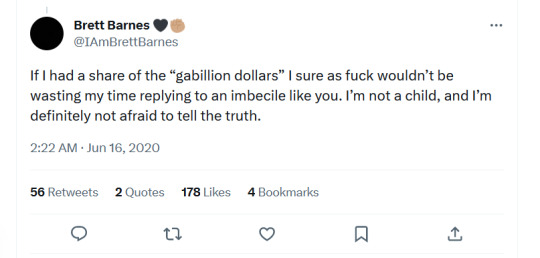
On June 16, 2020, Brett Barnes, a well-known figure in social media circles, made a tweet that sparked both interest and controversy. In his tweet, he expressed his frustration and disbelief toward an individual, stating, "If I had a share of the 'gabillion dollars,' I sure as fuck wouldn't be wasting my time replying to an imbecile like you. I'm not a child, and I'm definitely not afraid to tell the truth."
Unsurprisingly, this tweet has attracted attention due to the apparent hypocrisy of Brett Barnes. While he claims not to waste time engaging with individuals he deems unworthy, his own history on platforms such as Twitter and Facebook contradicts this sentiment.
Instead of fostering an environment conducive to open dialogue and transparency about his association with Michael Jackson, Barnes has chosen a more secretive approach. Additionally, he has occasionally resorted to disrespectful and derogatory tweets against those who have accused Jackson of wrongdoing.
It is essential to acknowledge that people's actions and statements on social media can sometimes be contradictory or misleading. In the case of Brett Barnes, his tweet raises questions about his level of sincerity and willingness to engage in meaningful discussions. Understanding the context and history of individuals' online presence is crucial in order to assess their credibility and the validity of their statements. Ultimately, it is up to each individual to critically evaluate the information presented to them.
0 notes
Text
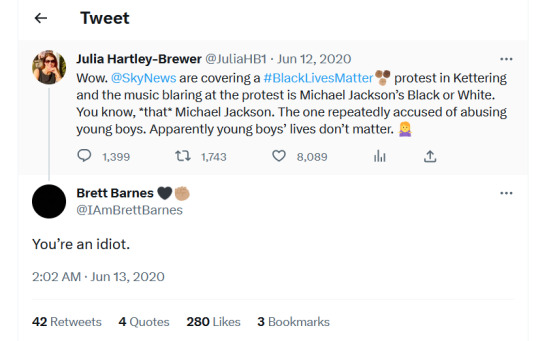
On Jun 13, 2020, a tweet by Brett Barnes sparked controversy within the online community. In his tweet, he referred to another individual as "you're an idiot." This incident unfolded during a discussion between Brett Barnes and Julia Hartley Brewer.
The discussion began when Julia Hartley Brewer shared a tweet expressing her observations about a #BlackLivesMatter protest in Kettering. She pointed out that the protest was playing Michael Jackson's song "Black or White." In her tweet, Julia highlighted the controversy surrounding Michael Jackson's alleged abuse of young boys, questioning the appropriateness of playing his music during a human rights movement.
While Julia's tweet remained civil and focused on the perceived hypocrisy, Brett Barnes responded with a derogatory remark. This interaction between the two individuals quickly gained attention due to the conflicting viewpoints expressed and the use of insults.
It is worth noting that this incident is an example of how online disagreements can escalate and involve personal attacks. While such exchanges may occur, it is important to remember the significance of respectful and constructive dialogue, even in instances where differing opinions are voiced.
Brett Barnes has faced criticism for his derogatory remarks not only in this specific incident but also for his previous tweets targeting individuals like James Safechuck and Wade Robson. These incidents have led some to perceive him as a hypocrite, as he seemingly supports one group while making derogatory comments about others.
Online discussions can often become heated, and it is crucial to approach such conversations with respect and open-mindedness. Remembering the importance of civil discourse and avoiding personal attacks can contribute to a healthier online environment.
Please note that this post aims to provide an objective analysis of a specific incident and does not endorse or condone any form of online harassment or derogatory language. It is essential to promote respectful online interactions and focus on constructive dialogue while engaging in discussions of any nature.
0 notes
Text

Brett Barnes expressed his frustration with an anonymous individual, addressing them as a "pathetic little troll" and suggesting they retreat to the place they came from. However, it is important to note that this tweet appears to be highly hypocritical coming from Brett himself.
Throughout his presence on social media, Brett Barnes has been known to engage in derogatory tweets and make baseless claims about individuals he has had no direct contact with. Notably, he has directed such remarks towards public figures like Wade Robson and James Safechuck. These comments raise questions about Brett's own behavior and attitude towards others.
Rather than using Twitter as a platform for meaningful and civilized discussions, Brett Barnes has devoted a significant portion of his online presence, spanning over a decade, to appeasing the fan base of Michael Jackson. While supporting one's interests is not inherently problematic, it is worth considering the opportunity cost of the time and energy spent on such endeavors.
In conclusion, Brett Barnes' recent tweet exhibits a level of hypocrisy when compared to his past behavior on Twitter. It underscores the need for individuals to reflect on their own actions and approach interactions with others in a respectful and considerate manner.
1 note
·
View note
Text

The tweet, originally shared by @MJJRepository, suggests that the extensive positive feedback, media coverage, and overall publicity surrounding the documentary may have been programmed and manipulated by the influential media company, Kew Media Distribution.
Controversially, this retweet perpetuates a conspiracy theory that undermines the seriousness and complexity of child sexual abuse allegations. It is worth noting that Leaving Neverland focuses on the accounts of individuals who have accused Michael Jackson of such abuse. Brett Barnes' retweet not only discredits the credibility of the documentary but also disregards the experiences and voices of the accusers.
By engaging in such discourse, Brett Barnes appears to be pandering to Michael Jackson's fan base, prioritizing their perspective over the allegations and the broader conversation about child abuse. It is unfortunate to witness public figures dismissing the gravity of sensitive issues and instead catering to personal biases.
As discussions surrounding Leaving Neverland continue to provoke intense emotions and divided opinions, it is important to approach the topic with sensitivity, respect for survivors, and a commitment to understanding the complexities of child sexual abuse. Only through thoughtful and empathetic dialogue can we hope to foster a more compassionate and supportive society for all.
0 notes
Text

On May 30, 2019, Brett Barnes took to Twitter to express his thoughts on the controversial documentary "Leaving Neverland." In his tweet, Barnes wrote, "#IKnewLeavingNeverlandWasBS when I heard about it. 'Nuff said."
While public figures are entitled to their opinions, this particular tweet sparked intense debate and generated strong reactions from both supporters and critics of Michael Jackson. It is important to note that sexual abuse is a deeply sensitive and complex matter that should always be treated with utmost respect and understanding.
Barnes' tweet appeared to dismiss the claims presented in the documentary, causing concern among advocates for abuse victims who felt it minimized the severity and impact of such actions. The tweet undoubtedly reached a wide audience, including thousands of Michael Jackson fans who may have shared similar sentiments.
However, it is crucial to approach discussions surrounding sexual abuse with empathy and open-mindedness. Engaging in productive dialogue while respecting the experiences and emotions of survivors is essential in addressing and combating this serious issue.
Remember that survivors of abuse deserve support, compassion, and a space to share their stories. Let us strive to create an environment that encourages empathy, education, and understanding when discussing such sensitive topics.
0 notes
Text

On April 16, 2019, a heated exchange took place on Twitter when Brett Barnes tweeted the following statement: "Hey dipshit, we were at court the day before we testified, waiting for the prosecution to rest. That's when I spoke to him. I didn't say I spoke to him at the ranch." This tweet was directed at another user who had exposed Taj Jackson for spreading falsehoods.
The crux of the controversy lies in Wade Robson's claims in the documentary "Leaving Neverland," where he alleges that during a pre-testimony dinner event, he witnessed Michael Jackson's daughter in distress. This experience played a significant role in solidifying his determination to defend Jackson during the 2005 trial.
However, Taj Jackson disputed Robson's account, asserting that the dinner actually occurred after Robson had testified, not before. In an attempt to support his standpoint, Taj Jackson brought Brett Barnes into the equation, claiming that Barnes corroborated his version of events. Unfortunately, this is where things took a deceptive turn.
Contrary to Taj Jackson's assertion, the truth is that the Robson family arrived at least one day before Wade testified. This fact can be confirmed through both Wade Robson's testimony and the testimony of his sister, Chantelle. In reality, it appears that Brett Barnes succumbed to the demands of Taj Jackson, a long-time critic of Wade Robson, and indulged in spreading falsehoods and misinformation to defend his uncle, Michael Jackson.
It is essential to understand and acknowledge the significance of truth and honesty in such matters. In this particular instance, it seems that Brett Barnes has unequivocally done wrong by spreading false information. The motive behind his actions appears to be influenced by Taj Jackson's agenda, rather than an honest search for the truth. Such behavior not only undermines the integrity of the discussion but also perpetuates a cycle of deception and misinformation.
As observers, it is crucial to approach contentious topics with objectivity and a commitment to discovering the truth, rather than being swayed by personal biases or allegiances. Only through a genuine pursuit of the facts can we shed light on the events that unfolded during that tumultuous period.
Let us remember that in sensitive situations such as this, it is of utmost importance to prioritize truth and honesty, even when it challenges our preconceived notions or threatens to shake the foundation of our belief systems. By doing so, we contribute to fostering a climate of integrity and accountability in public discourse.
0 notes
Text

On February 11, 2019, a tweet by Brandi Jackson, the niece of Michael Jackson, stirred up controversy when it was retweeted by Brett Barnes. The tweet read as follows:
"Wade and I were together for over 7 years, but I bet that isn't in his 'documentary' because it would ruin his timeline. And did I mention, it was my uncle, #MichaelJackson, who set us up? Wade is not a victim, #WadeRobsonIsALiar."
It is important to note that these claims made by Brandi Jackson are baseless and lack evidence. There is no factual information to support her assertion that she and Wade Robson were in a relationship for over 7 years.
Brett Barnes' decision to retweet this statement raises concerns, as it promotes and amplifies unverified allegations. It is crucial to approach such claims with skepticism and consider the potential harm they can cause. Making baseless accusations about a sensitive topic like sexual abuse can discourage survivors from coming forward and seeking justice.
It is essential to prioritize the well-being of victims and create an environment that encourages truthful disclosures. When handling topics of this nature, we must rely on verified information and ensure that our actions do not perpetuate misinformation or harm the credibility of survivors.
0 notes
Text

On February 1, 2019, Brett Barnes retweeted a post by Taj Jackson, which criticized the allegations of child sex abuse made in the shocking documentary, "Leaving Neverland." The documentary, centering on Michael Jackson, has sparked intense debate and emotions worldwide.
It is important to note that retweeting a message does not necessarily imply full agreement or endorsement of its content. While Brett Barnes may have shared Taj Jackson's tweet, it does not automatically mean that he shares the same viewpoints or believes the allegations made.
Taj Jackson has been known to be a vocal critic of those who accuse his uncle, Michael Jackson, of wrongdoing. While Taj may express his dissent in a passionate manner at times, it is crucial to approach discussions surrounding such sensitive subjects with respect and empathy.
It's worth mentioning that engaging in behavior solely to impress others or gain support from a particular group does not justify actions that may be perceived as baseless or unfounded. It is essential to stick to truthful and well-substantiated arguments when discussing such serious matters.
The controversy surrounding the accusations against Michael Jackson calls for open dialogue, empathy, and a diligent evaluation of the available evidence. By engaging in respectful conversations, we can encourage a more nuanced understanding of complex issues.
0 notes
Text

On January 30, 2019, Brett Barnes took to Twitter to voice his opinion regarding the controversial documentary "Leaving Neverland" and its subjects, Wade Robson and James Safechuck. In his tweet, Barnes made the following statement:
"Not only do we have to deal with these lies, but we've also got to deal with people perpetuating these lies. The fact that they fail to do the small amount of research it takes to prove these are lies, by choice or not, makes it even worse."
It is important to address the fact that Barnes's claims are entirely unfounded and derogatory. There is no concrete evidence to support his allegations that Robson and Safechuck are lying about their experiences with Michael Jackson. His assertion that a quick research would prove these allegations false is misleading.
"Leaving Neverland" is a documentary that recounts personal accounts from Robson and Safechuck, who have accused Michael Jackson of child sexual abuse. While these accusations sparked a wide range of debates and discussions, it is crucial to understand that the claims made in the documentary were not disproven or discredited at the time of Barnes's tweet.
Public opinion regarding these allegations may differ, but it is essential to approach such discussions with empathy and respect for the experiences of the survivors. Dismissing their claims without thorough investigation can perpetuate an environment that discourages victims from coming forward and sharing their stories.
Barnes's motive behind spreading unverified information, even if it was to please the Michael Jackson fan base, is concerning. Engaging in meaningful conversations about complex topics such as this one requires careful consideration of all perspectives and the use of sound evidence.
In conclusion, while Brett Barnes made bold claims on Twitter, it is important to critically examine the validity of such statements. The allegations made by Robson and Safechuck in the documentary "Leaving Neverland" deserve thoughtful evaluation and respect for the courage displayed by individuals who come forward with their stories of abuse.
Please note that it is crucial to treat sensitive topics with care and empathy, avoiding making baseless claims that can further harm those involved.
0 notes
Text

On January 27, 2019, Brett Barnes took to Twitter and posted a tweet that sparked a considerable amount of controversy. In his tweet, he made an unusual comparison between sexual abuse and a famous science fiction movie, "Independence Day." The tweet read as follows:
"So people are getting their facts from a movie now? I wonder how they feel about the documentary showing the great alien invasion of '96. I think it was called Independence Day."
It is important to address the concerns raised about this tweet, as it raises questions about the appropriateness and potential impact of such comparisons. Comparing a serious matter like sexual abuse to a Hollywood blockbuster can be seen as disrespectful and inappropriate.
Victims of sexual abuse often struggle with speaking out, fearing judgement or not being taken seriously. Hence, any attempt to trivialize or make light of their experiences has the potential to discourage others from coming forward.
While everyone is entitled to their opinions and freedom of speech, it is crucial to create an environment that encourages empathy and support for victims of abuse. A tweet like this can inadvertently perpetuate the negative stigma surrounding sexual abuse and undermine the efforts of those who seek justice and healing.
It is essential for individuals to exercise sensitivity and consider the potential impact of their words, especially when discussing sensitive topics like abuse. Only through open and respectful dialogue can we foster a community that supports survivors and works towards preventing such incidents from occurring in the future.
1 note
·
View note
Text

On January 12, 2019, Brett Barnes took to Twitter to express his support amidst a heated controversy surrounding the Leaving Neverland documentary. Reacting to Taj Jackson's baseless and derogatory claims against James Safechuck and Wade Robson, Barnes reached out with a heartfelt message saying, "Let me know if you need anything from me."
Taj Jackson, a vocal critic of the documentary, has been widely known for his strong opposition to its claims. However, it is important to note that Brett Barnes, despite offering his assistance to Jackson in any way possible, has ultimately decided against appearing in his documentary.
The Leaving Neverland documentary, directed by Dan Reed, delves into allegations of sexual abuse against the late pop superstar, Michael Jackson. As the documentary gained significant attention worldwide, it stirred up a range of emotions and fueled discussions about the credibility of the accusers and the legacy of the iconic performer.
Brett Barnes, a longtime friend of Michael Jackson, has had his own connection to the controversy surrounding the pop legend. Despite being publicly linked to Jackson as a child, Barnes has maintained his innocence and denied any misconduct or abuse throughout the years.
As the debate surrounding Leaving Neverland continues, it is essential to approach the topic with sensitivity and respect for all parties involved. Voices from both sides have emerged, often sparking intense discussions, and it remains a subject with no easy resolution.
0 notes